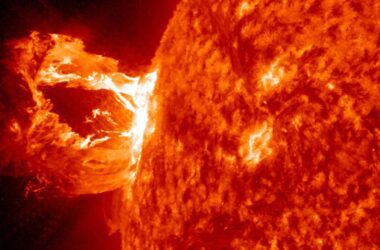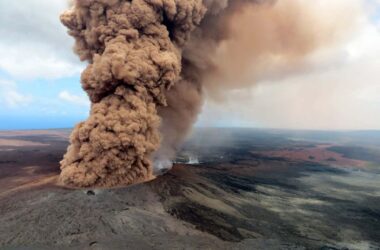A map from a new study showing the locations of “irrecoverable carbon” worldwide
Monica L. Noon et al. (2021)
The percentage of the world’s most fragile and important carbon storage ecosystems that are protected is only 23%. A study that identifies these carbon reserves can then be used to guide efforts to maintain them undeveloped and protect biodiversity.
Carbon is stored in many of Earth’s ecosystems, including forests and peatlands. Large amounts of carbon may be released into the atmosphere when humans destroy natural ecosystems for commercial interests, such as agriculture.
Once carbon is released, it might take these ecosystems years, centuries, or even millennia to begin storing it again. By 2050, when the world must achieve net-zero emissions to avert the worst impacts of climate change, there will be a lot of carbon that can’t be reclaimed.
Conservation International is a Virginia-based environmental nonprofit led by Monica Noon, who, along with her team, compiled multiple data sets on carbon storage in order to create a global map of carbon loss.
Half of the world’s unrecoverable carbon is found to be stored on only 3.3% of the land. Peatlands and forests in the Amazon and Congo basin, forests in North America and Siberia, and mangroves and wetlands worldwide contain the highest concentrations of irrecoverable carbon stores. Only around one-fourth of these areas are designated as protected.
Noon hopes that by drawing attention to these irretrievable carbon hotspots, more effective policies will be implemented to manage and conserve these vital carbon storage ecosystems, thereby mitigating the effects of climate change.
Short-term solutions could consist of offering financial incentives to governments to slow down forest clearance. Long-term, this might entail funding the expansion of protected areas around the world and bolstering the rights of Indigenous people, who care for roughly a third of the land that holds irrecoverable carbon.
It’s possible to safeguard areas and have a sort of win-win situation when considering biodiversity and climate since “87 percent of biodiversity overlaps with high irrecoverable carbon areas,” as Noon puts it.
FAQs
- What are carbon reserves, and why are they important?
- Carbon reserves refer to ecosystems like forests and peatlands that store carbon. These are crucial in mitigating climate change by preventing the release of carbon into the atmosphere.
- Why is protecting carbon storage ecosystems vital?
- These ecosystems play a critical role in preventing carbon emissions. Destroying them can release substantial carbon into the atmosphere, exacerbating climate change.
- How much of the world’s carbon reserves are currently protected?
- Only 23% of the world’s carbon storage ecosystems are protected. This means that the majority are at risk of degradation or destruction.
- Which areas have the highest concentrations of unrecoverable carbon stores?
- Irrecoverable carbon hotspots include peatlands and forests in the Amazon and Congo basin, North American and Siberian forests, as well as mangroves and wetlands worldwide.
- What is the significance of biodiversity in these carbon-rich areas?
- Around 87% of biodiversity overlaps with high irrecoverable carbon areas, highlighting the interconnectedness of preserving these regions for both climate and biodiversity reasons.







